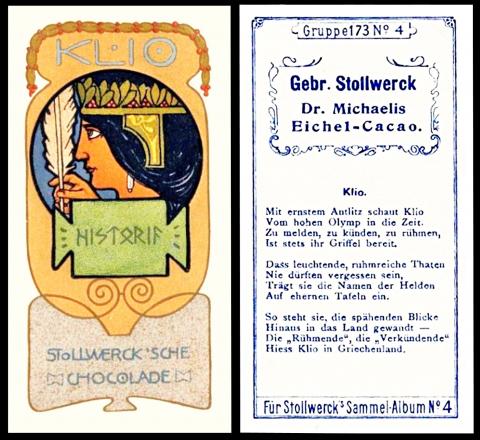
I will start with a correction, for this is not Cleopatra, it is Klio, or Clio in the English and she is part of a six card set, which fits in album number four, and is known as Group 173, “The Muses”.
Stollwerck seem to have plucked their set order from thin air, as this set was bookend-ed by Group 172 “Ornamental Shrubs” and by Group 174 “From the Aquarium”; and yet there are more muses, “Artistic Muses”, which would complement these very well, if they were not buried right down at Group 85.
A muse is someone, sometimes real, but more usually imagined, who provides inspiration for an artist`s work, and these are six of the Nine Muses from Greek mythology, daughters of Zeus and Mnemosyne. namely 1. Polyhymnia, 2. Melpomene, 3. Euterpe, 4. Klio 5. Terpsichore and 6. Thalia. The ones that are missing are Calliope, Erato and Urania.
There are various backs for this set, by the way, as many of the Stollwerck cards.
A very brief look at Mr Franz Stollwerck finds him starting a business, in Cologne, as a baker in 1839, but for some reason he added chocolate and other sweets, especially cough drops, which were so good that local chemists tried to ban them, but failed. He started all kinds of endeavours, coffee houses, selling cocoa and coffee, one of which had the added attraction of performers and musicians as you drank. His sons also started a company, though this is sometimes unfairly thought to be simply another of his own endeavours; and they were sufficiently skilled to take over his business when he died in 1876, and his sons expanded the business enormously, taking their goods to America, though this was a really good move as a lot of Americans had emigrated from Germany, and would have been more familiar with the Stollwerck name than any American ones. Another first was a machine into which you inserted coins and out of which came a chocolate. By the turn of the nineteenth century there were thousands of these “vending” machines, handing out cigarettes, gum etc, both in the street, and more valuably, in train stations.
Like all companies, it was badly affected by the First World War, works were damaged and many staff were injured or killed. It was also affected by the aftermath, for they lost their American subsidiary as part of reparations in 1919. Then in the 1930s, the firm had no choice but to pass into the hands of Deutsche Bank and out of the family. The Second World War was just as devastating, for let us not forget they were based in Cologne, hit so hard by Allied bombing.
